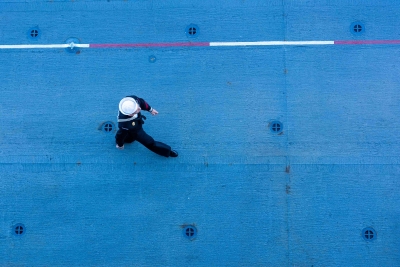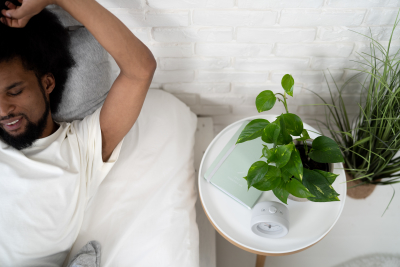
How to Shut Down After Work
Moderate stress helps your body adapt to situations. In essence, it fulfils a positive function because it pushes the body to act. However, if its impact is long lasting, it can be detrimental to your health. Unfortunately, stress is something we have to deal with on a daily basis. It may be caused by your work, your family, changes to your environment or various other things.
Doing too much can make you unwell but there’s still a lot of societal pressure to be productive. The majority of us are expected to live a fast paced life, it has become commonplace that we work all day and find ourselves too exhausted to do anything but watch Netflix after work. It’s important that you find a moment for yourself every day. What you do with that moment is up to you but it’s generally a good idea to use this time to calm down, to process all that you’ve achieved during the day or to simply attempt to clear your mind.
The human body, which has to be ready to cope with unexpected conditions at all times, is in a state of constant excitement and willingness to act. It produces large amounts of energy, the circulatory system and glands work ‘at high speed’ and the muscles are tight. If this accumulated energy doesn’t find an outlet, you can become upset and aggressive.
Constant mobilization of the body weakens the immune system and therefore stress is increasingly named as the cause of many diseases. Some people are genetically predisposed to handle stress better than others.[1] We’re all unique, so something that works for one person, may not work for another. That’s why it’s so important to learn the relaxation techniques that work best for you, to be able to reduce the negative effects of stress.
Breath in, breath out.
In the fight against stress, it helps to breathe properly. Lie down comfortably and watch your breath. Exhale, wait a moment, then inhale so that the diaphragm raises. Repeat this cycle for a few minutes, focusing on your breath. Then try to stretch and relax your muscles. After inhaling, hold the air in your lungs and tighten your muscles.
When exhaling, try to relax as much as possible, start with your feet, slowly moving to your shoulders, neck and facial muscles. After a few minutes, you will feel a pleasant, relaxing warmth. Mastering the art of breathing is the basis of meditation. It is difficult to determine exactly what kind of meditation is best, as it can involve anything from being in touch with nature to simply praying.
You will need to find a secluded, peaceful place where no one will disturb you. Wear loose, simple clothes and assume a comfortable position. Focus on breathing and allow your thoughts to flow freely. Do not fight negative emotions, try to adopt the attitude of a passive observer. The next step may be visualizing or talking with yourself through images, whether in your head or out loud. Try to imagine pleasant scenes and concentrate not only on the image but also on the sounds and feelings. This remedy for stress is becoming a technique of choice for many people.
Yoga is not just a form of exercise but an entire philosophy of life. It improves physical fitness, teaches you about taking control over your breathing and your body, it also enables you to live in harmony with yourself. Tai-chi, on the other hand, is based on the premise that the uninterrupted flow of the chi energy chi through the body is a guarantee of good health. This form of ‘gymnastics’, which involves repetition of movement sequences to remove blockages, teaches conscious stretching and muscle relaxation, which are valuable skills in combating stress.
Doing sports is another way to regain inner harmony. Physical exercise stimulates blood circulation, eliminates tension and causes the secretion of endorphins, substances that improve your mood. It is important to maintain a proper diet. It must be abundant in vitamins B, B6 and magnesium. Limit your intake of sugar and caffeinated beverages as they only improve your activity momentarily, and when they stop working you become immersed in an even greater feeling of apathy.
A Hindu proverb says that everyone is a house with four rooms, i.e. a physical, a mental, an emotional, and a spiritual room. Just as people take care of their whole house, they should take care of the four ‘rooms’ inside themselves. In order to maintain good health and to combat various illnesses, it is necessary to clean the body but one should also improve the mind and strengthen the spirit. A person who is happy and prepared to overcome the obstacles that they may encounter in life will be better able to cope with illness. A person is not just a body. and quite often mental issues are the cause of somatic ailments.
Does herbal medicine work to combat stress?
Herbal remedies don’t work in extreme cases but they can help with minor ailments such as acute stress or slight stomach upsets etc. Although widely considered to be pseudoscientific, taking advantage of the calming properties of herbal mixtures can sometimes make a difference.
Bacillus flower infusion
It is particularly effective for people suffering from insomnia and anxiety. To prepare the infusion put one tablespoon of lemon balm into a cup of boiling water, cover and set aside for 15 minutes. Drink half a glass of the infusion three or four times a day.
Hop cones infusion
It is very effective for those with excessive excitability and mood swings. Put one tablespoon of hop cones into one glass of boiling water, cover and set aside for fifteen minutes. Strain and drink a third of a glass of the infusion three times a day.
Chamomile mixture
Mix equal quantities of chamomile, marjoram herbs, peppermint leaves and caraway seeds. Put one tablespoon of the mixture into one glass of boiling water. Cover and set aside for fifteen minutes. Drink half a glass of the infusion three times a day before meals.
Ashwagandha
Often taken in the form of drops or capsules, this is a very popular herbal supplement that can be taken to deal with minor anxiety issues. It works as it helps to lower levels of cortisol, which is a hormone produced by your adrenal glands as a response to stress.
Other herbal remedies worth mentioning would be valerian root, kava kava, rhodiola, lavendar and passionflower. Nature’s pharmacy probably has a few other secrets in it to deal with stress.
What can you do to live a more peaceful life?
If the reason for our sorrows is the way that we think, we can help ourselves by trying to changing that. To correct errors in our thinking, we can start keeping a list of everyday activities. Plan simple things in the beginning. Tick everything that you have done. Emphasize the things that you are especially proud of and those that made you happy.
If you notice that you are sad, try to consider what kind of thought processes caused these negative emotions. Everyone has sad thoughts sometimes but more introverted or melancholic people tend to encounter them quite often. It is largely dependent on your personality type but negative opinions about yourself usually come from comparisons with other people who seem to be more attractive, smarter, fitter, more resourceful etc. Self-criticism and self-blame can cause a person to focus on their shortcomings but we should remember not take responsibility for negative events. If you feel ready, you could try meditation or yoga to help yourself find what’s known as ‘inner peace’.
What can you do after a stressful day at work?
If you sometimes feel that after a stressful day at work your arms, back or body are tense and you cannot relax, it means that you need to relax. Stressful events make our whole body react as though we’re ready to fight. This emphasises the need for relaxation and rest in the evening. There are hundreds of methods people use to relax, we’ve listed a few here:
● Taking a hot bath is a great form of relaxation, especially on a cold winter day when you don’t want to go out for a long walk or a run in the park. Hot baths are relaxing and stimulate circulation. Try adding essential oils, bubble bath or bath salts (any kind) to your bath water.
● Sport is a great way to relax after a day spent working on a project, office work or intellectual activity. It’s better to do any form of exercise or training after work as it can sometimes be hard to focus on work when you’re tired.
● Schultz’s autogenic training is a proven relaxation training method. It consists of repeating lines such as: Relax your hand (and then another part of your body), your hand is heavy, very heavy. The feeling of gravity is related to the relaxation of tension. Of course, this method allows us to relax various muscles but takes a little bit of practice.
● Jacobson’s training is a method similar to autogenic training but recommended for those who like physical activity and may feel tired of the monotony of autogenic Schultz training. It involves stretching and loosening individual muscle groups. If you’re dealing with intense tension, the feeling of relief associated with relaxation is a very noticeable and extremely soothing experience. The training can be done while lying down at first. It is useful for dealing with stress and it can help if you have trouble falling asleep.
● Visualization is a method that can help you relax after a hard day at work and in some cases, when you are afraid of something. Imagining a safe place or a soothing image associated with pleasant memories reduces the level of tension and anxiety. If we feel tension in a particular part of the body, we can also visualize ‘erasing’ that tension with our imaginations, using a sponge or eraser. We may also try to make hand movements similar to those that we would make if said sponge or eraser was in our hands.
Remember that the most effective method is to find a balance between your job and personal life. Live to live, not just to work.
What to do after a stressful day at work?
Is there anything you’d like to add, have we missed anything? If you’re interested in sharing your experiences with us or writing a guest post for us, send us an email via hello@mudita.com!
Please feel free to get in touch via social media (send us some photos or videos too), you can find us on Facebook, Twitter and Instagram, let’s connect! To learn more about Mudita, take a look at our website and our other posts.
If you enjoyed reading this article, please share and recommend it!
Related stories

Why do Navy SEALs use box breathing?
Box breathing is a technique used by Navy SEALs, athletes, and others in high-stress situations to help manage stress and maintain focus.
Are you suffering from ‘rust-out’?
Workplaces are more than just places where we fulfill our professional commitments, they're significant parts of our lives, shaping physical & mental health.

Why rest & relaxation are important for health & happiness
Sleep is essential for our physical and mental health. It helps us manage stress, remember information we learn during the day and be more creative.
If you'd like to receive the best stories from our blog, keep up to date with our progress and get notified about our product releases and special discounts.